
A Letter to Myself in Recovery
One of the many reasons I cherish the opportunity to work with clients in recovery from eating concerns is that I have been on my own recovery journey. While my eating disorder does not play an active role in my life anymore, I still find it valuable to look back at my recovery process and reflect on the struggles, challenges, and changes of recovery. In today’s blog, I want to share a letter with you–one that I wish I could have read when I was in the trenches of my recovery battle. Even though everyone’s recovery journey is unique, I hope you’ll be able to find something that helps you, wherever you are on your recovery path.
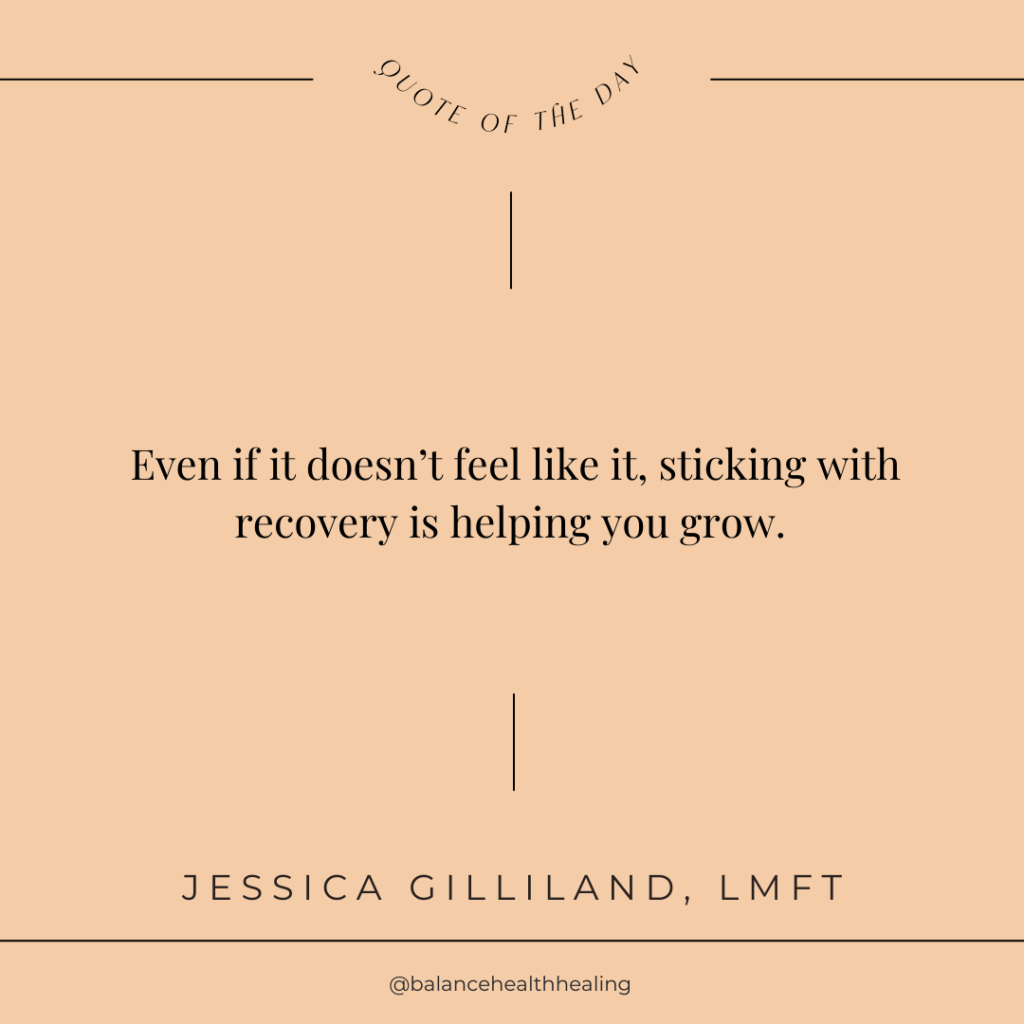 Dear Recovering Me,
Dear Recovering Me,
It’s me (you), from the future. I wish so badly that I could invite you here for a visit, so you could see everything that is waiting for you. As I think about you and the struggle you’re going through, trying so hard to recover, I have so many things I want you to know. Here are just a few:
1. Recovery won’t always feel as hard as it does right now. I know it feels like the daily battle will never get easier, and will never change, but I can promise you that it will feel better someday. I won’t lie to you and say that things will get easy quickly; I can promise you that someday, it will feel easier to unhook yourself from those eating disorder thoughts and behaviors. Not all of the challenges of your eating disorder will disappear in the future, but you will be stronger and more capable of handling them. Even if it doesn’t feel like it, sticking with recovery is helping you grow.
2. Recovery really will be worth it! I know everyone is saying that to you, and I get that it can feel frustrating to be told “it will be worth it” when it feels like recovery is an impossible battle to fight. You can trust me–I am living in your future, and it is better than you can imagine.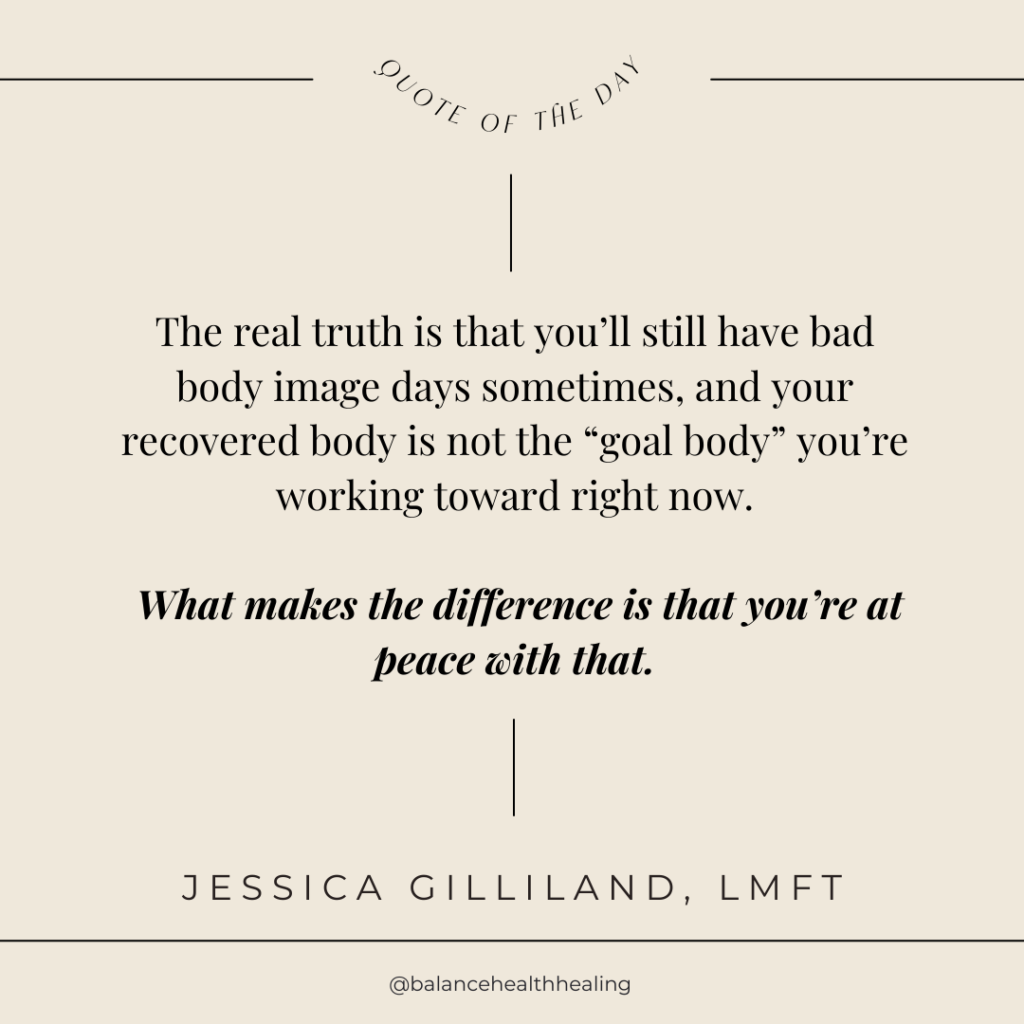
Picture this: making and eating delicious homemade pizza with your new husband every night for almost two weeks (the two of you will call it “The Twelve Days of Pizza”), and truly enjoying every bit of the experience without guilt, worry, or eating disorder behaviors. Another one for you: looking down at your round, saggy, stretch-marked belly after giving birth to a baby, and crying tears of sincere gratitude, awe, and love for your amazing body. There are so many gifts of recovery, big and small. It will be worth it!
3. In the future, there will be times when you don’t like how your body looks… but that won’t matter to you the way it does now. I know you probably wish I were saying something like, “You are going to LOVE the way your body looks in recovery. You’ll for sure be happy with how it looks all the time.” Sorry, that’s not the truth that’s waiting for you. The real truth is that you’ll still have bad body image days sometimes, and your recovered body is not the “goal body” you’re working toward right now. What makes the difference is that you’re at peace with that. You’re ok with not loving your body’s appearance all the time, because you see your body as more than what it looks like. You’ll have so many other things that you want to give your time and attention to, besides having food and your body take up every bit of your focus. When negative body image moments come up, you’ll feel able to move on from them without turning to your eating disorder.
There are so many other things I wish I could tell you from where I am on the other side of recovery. Keep holding on, and keep trying!
With love,
Me
Thanks for reading along. If you feel inclined to, writing a letter of your own could be a helpful and insightful experience. Writing a letter to a past version of yourself, maybe the version that was just beginning to develop an eating disorder, or the version that is in a tough period of recovery, can be a powerful way to acknowledge the growth and perspective you’re gaining. It can also be a way to remind yourself that where you are now is not where you’ll be forever. And if writing a letter of your own doesn’t feel helpful right now, feel free to borrow whatever pieces of mine you want to take with you. I am rooting for you!

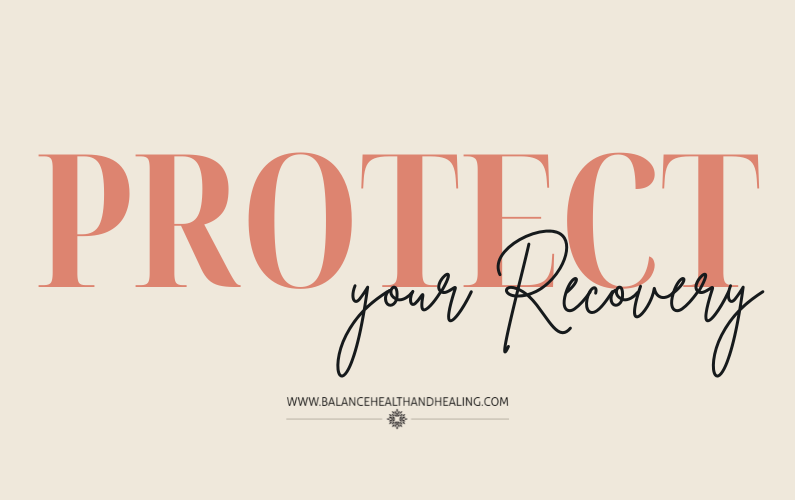
 One of the most important parts of protecting your recovery is having a schedule that safeguards you against slipping into unhelpful patterns. Doing your best to create a daily schedule that protects your recovery is essential to making your recovery last. Here are a couple of practical ways you can do this:
One of the most important parts of protecting your recovery is having a schedule that safeguards you against slipping into unhelpful patterns. Doing your best to create a daily schedule that protects your recovery is essential to making your recovery last. Here are a couple of practical ways you can do this: those activities, or shifting your schedule so nothing gets in the way. Set reminder alarms in your phone, cancel plans that would cause you to skip a meal, bring food with you everywhere, ask your professors for permission to step out and eat a snack during class, etc. That might sound intense, I know, but your recovery is worth protecting. And rest assured, as you make progress in recovery, more flexibility can come as you learn to respect and respond to your body’s needs consistently.
those activities, or shifting your schedule so nothing gets in the way. Set reminder alarms in your phone, cancel plans that would cause you to skip a meal, bring food with you everywhere, ask your professors for permission to step out and eat a snack during class, etc. That might sound intense, I know, but your recovery is worth protecting. And rest assured, as you make progress in recovery, more flexibility can come as you learn to respect and respond to your body’s needs consistently.
 belongs to my son. My heart swells when I see my little boy hug and talk to his teddy bear. Theodore was (and is) very important to me, first because he was my favorite toy, and later because he came to represent home, safety, and comfort for me (and now for my son). We all need a “Theodore” in our lives–something constant and comforting to turn to when we feel vulnerable, hurt, or alone.
belongs to my son. My heart swells when I see my little boy hug and talk to his teddy bear. Theodore was (and is) very important to me, first because he was my favorite toy, and later because he came to represent home, safety, and comfort for me (and now for my son). We all need a “Theodore” in our lives–something constant and comforting to turn to when we feel vulnerable, hurt, or alone.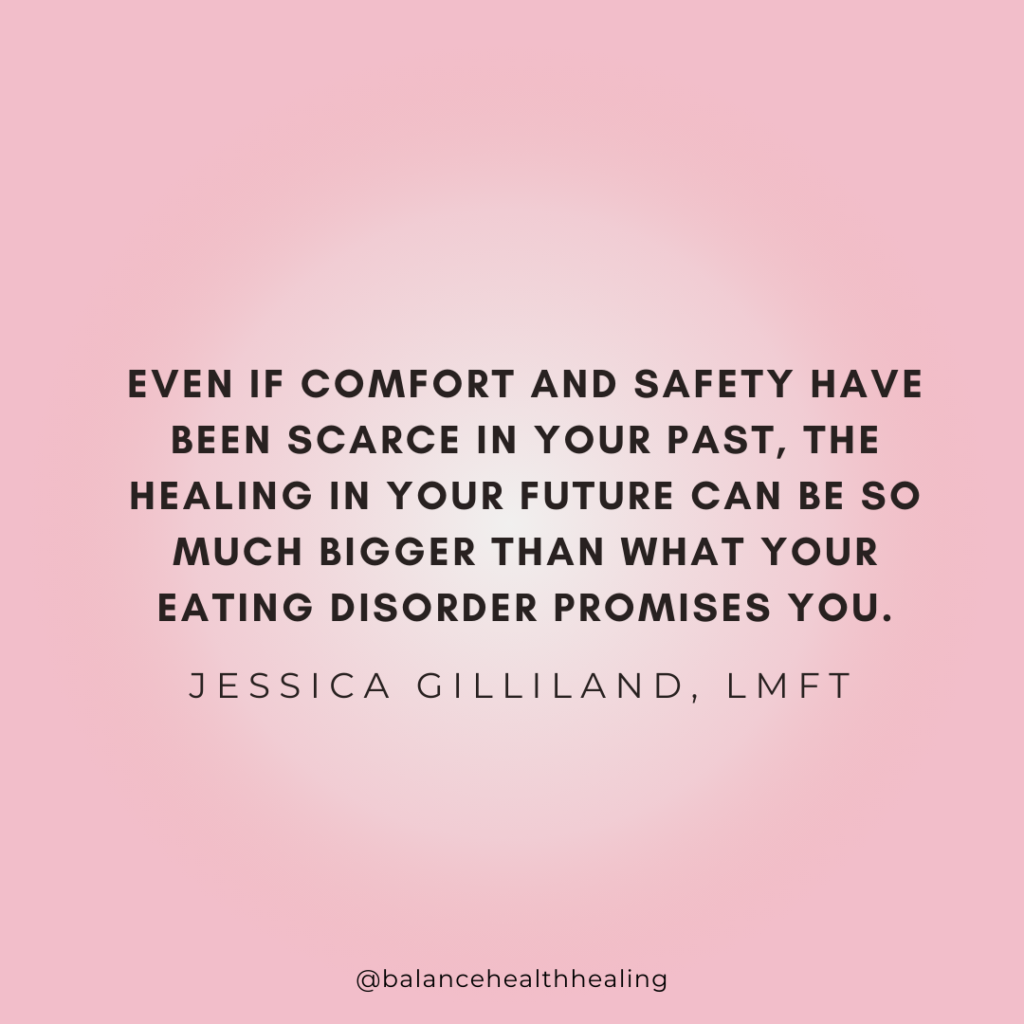 Recently, in a group therapy session I was leading, I asked group members to write down what their eating disorders have given them. On this occasion, every group member listed the word “comfort.”
Recently, in a group therapy session I was leading, I asked group members to write down what their eating disorders have given them. On this occasion, every group member listed the word “comfort.” 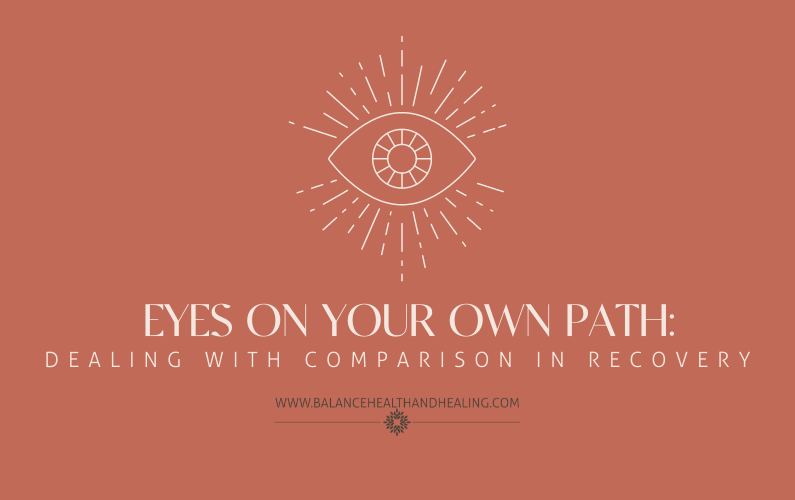
 When I read this mic-drop of a definition, I think about how comparison shows up in eating and body image recovery. It shows up in ways that might seem obvious: comparing your body to other peoples’ bodies, comparing what you’re eating to what everyone else is eating, comparing your workout routine to everyone else’s, and on and on. And then there are the comparisons between your current body and your past body–“before and after” pictures, items of clothing that used to fit differently, etc. Comparison can feel motivating at times (for better or for worse), but for most people,
When I read this mic-drop of a definition, I think about how comparison shows up in eating and body image recovery. It shows up in ways that might seem obvious: comparing your body to other peoples’ bodies, comparing what you’re eating to what everyone else is eating, comparing your workout routine to everyone else’s, and on and on. And then there are the comparisons between your current body and your past body–“before and after” pictures, items of clothing that used to fit differently, etc. Comparison can feel motivating at times (for better or for worse), but for most people, 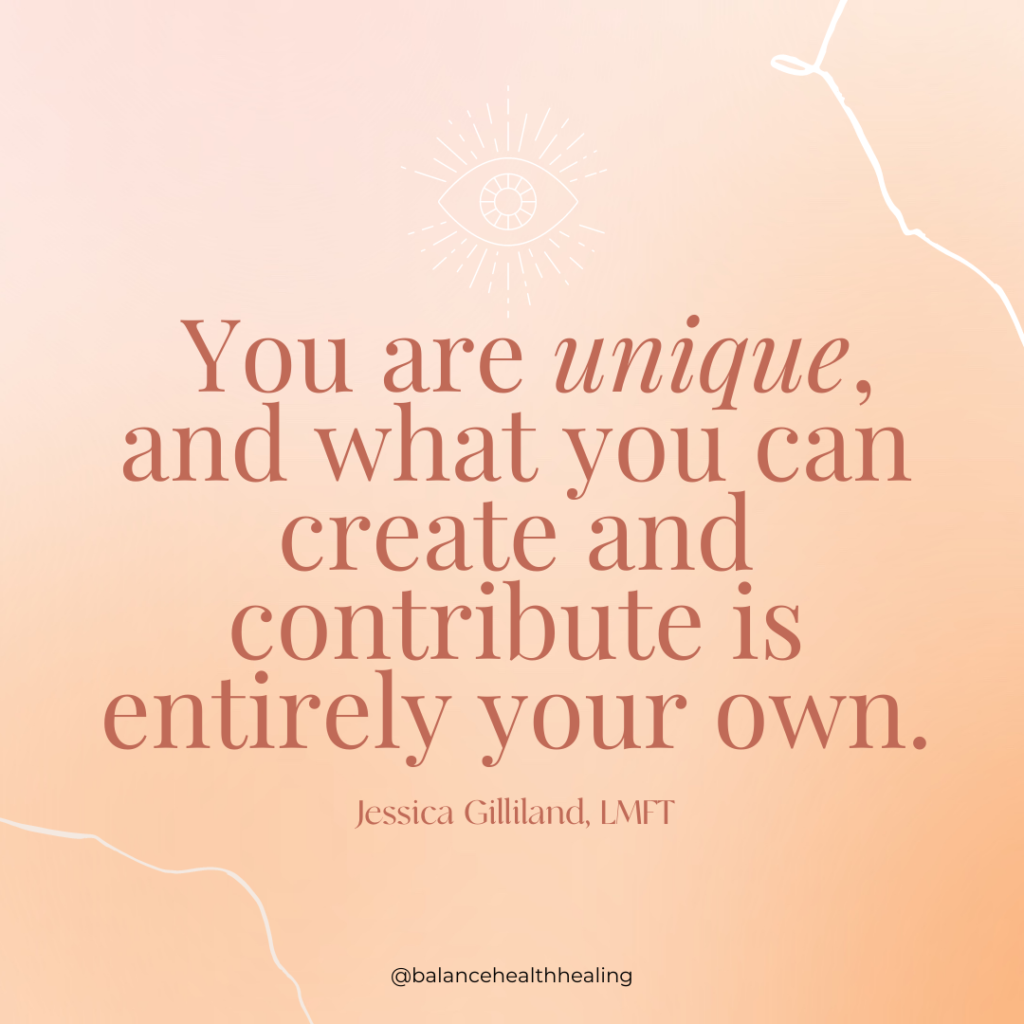 a constant state of calculation. Living life through creativity is like being a paintbrush–flexible, unbounded, and in a state of inventiveness.
a constant state of calculation. Living life through creativity is like being a paintbrush–flexible, unbounded, and in a state of inventiveness.
 Once upon a time, there was a girl who had a marvelous talent for inventing machines. From the time she was old enough to pick up a hammer, she created contraptions that amazed everyone in her village. As the girl grew, her inventions became more and more magnificent. Her innovative mind was bursting with ideas for making her village a better place. At age 16, she created her finest invention yet: a complex pulley system that allowed the villagers to transport heavy loads of stone from the quarries, straight to their village building sites.
Once upon a time, there was a girl who had a marvelous talent for inventing machines. From the time she was old enough to pick up a hammer, she created contraptions that amazed everyone in her village. As the girl grew, her inventions became more and more magnificent. Her innovative mind was bursting with ideas for making her village a better place. At age 16, she created her finest invention yet: a complex pulley system that allowed the villagers to transport heavy loads of stone from the quarries, straight to their village building sites. pulley, hurriedly oiling and sanding the jagged rust that was wearing the ropes down. She flashed nervous smiles at the workers, not wanting them to worry about the state of her invention.
pulley, hurriedly oiling and sanding the jagged rust that was wearing the ropes down. She flashed nervous smiles at the workers, not wanting them to worry about the state of her invention.  Here are a few thoughts that may have been useful to the girl in the story, and that may be useful to you when things feel like too much:
Here are a few thoughts that may have been useful to the girl in the story, and that may be useful to you when things feel like too much: